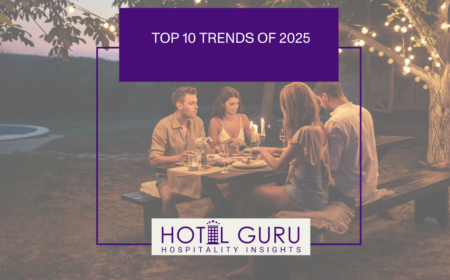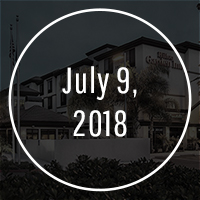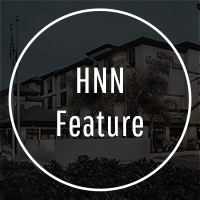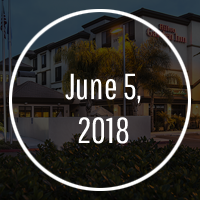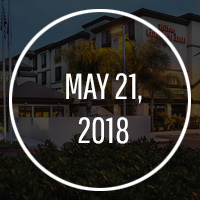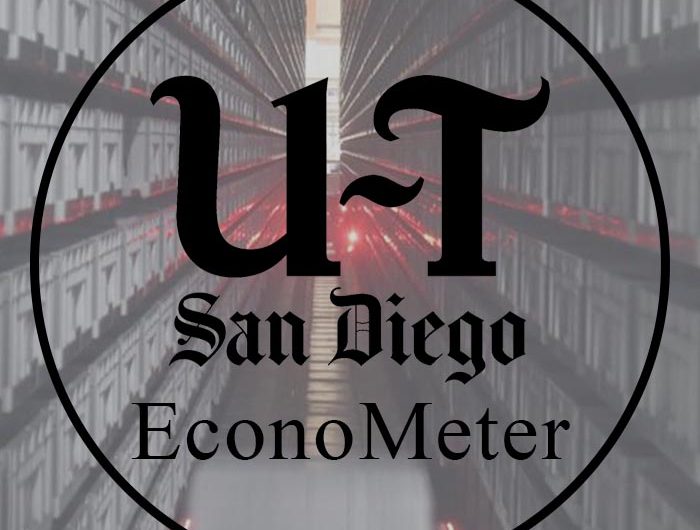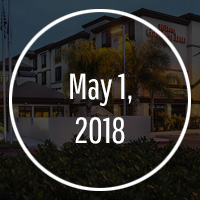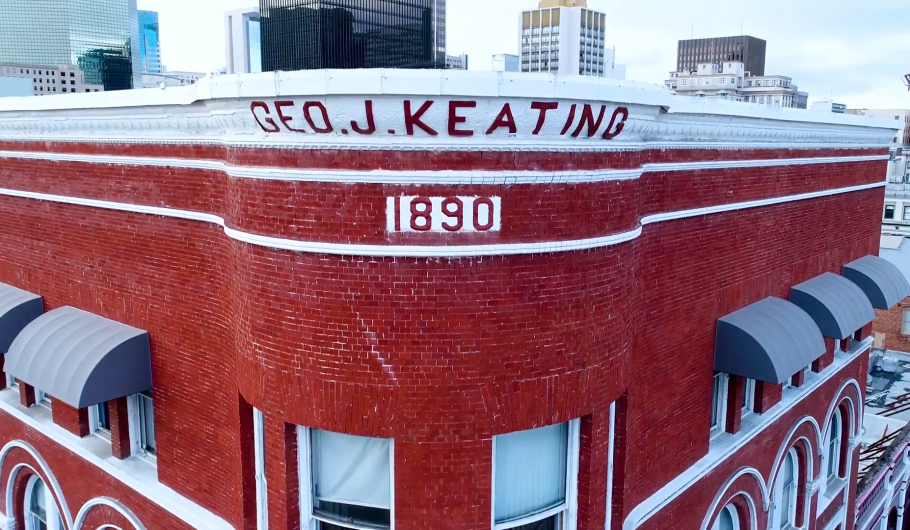Mid-year 2018: Brands, OTAs, Marriott, Blockchain, Robotics and Sustainability
Online travel agencies (OTAs) outspend brands by a wide margin and continue to steal market share from brands. As Marriott is becoming more of a global brand with 30 brands and a home-sharing company in their portfolio, we see a new war developing. Airbnb, a behemoth home-sharing company, is regularly getting beat up by cities who are adding regulations quickly. They will become an OTA by 2020 and begin to compete with Expedia and Booking rather than Marriott, Hilton, and the hotel community. After all, they only charge three percent for their services and could get 10 as an OTA!
At the Lodging Industry Investment Council meeting, we heard STR talk about measurement of operating profits versus revenues. Labor growth has seen leaps and bounds in certain markets. STR has a new report that compares revenue growth to GOP growth by major market. Look for more measurement tools from STR and others going forward.
Augmented reality (AR) technology is coming to eight Marriott International properties and creates a 360-degree, virtual reality (VR) views of properties in the Marriott Caribbean & Latin America Resorts collection. Previously, VR required wearing cumbersome goggles, but now Apple’s new ARKit technology brings it to your iPhone.
The way that AR works is simple: after downloading an app, users aim their phones at a flat surface. A door appears that they walk through and transports them to a resort. The system can be downloaded through the “Portal to Paradise” app in the Apple store or its website. The eight properties currently available include Marriott Resorts in Aruba, Cancun Resort, Puerto Vallarta Resort & Spa, Los Cabos Grand Cayman and St. Kitts.
Blockchain
While we are still in the very early days of blockchain adoption in hotels, there are some promising areas of blockchain application for the hospitality industry, including loyalty programs, distribution and more. Blockchain, a digital chain made up of blocks of information, registers transactions between individuals and ensures security by validating the information of both individuals taking part. Every time a transaction is made in the blockchain, that information is encrypted, stored in a “block” and permanently added onto the end of the chain.
Transactions made in the blockchain are fast and its simplification of the transaction process is enticing as it could eliminate “middle men” like OTAs. OTA commissions are a cost that hotels have had to endure for two decades, but with blockchain, things could change quickly. Those that don’t own hotel rooms, flights or other commodities bought and sold on their sites could suffer.
Removing these middle men in the booking process would generate a significant impact on the market, making hotels more profitable to own. Disney, already known for their innovation, began building a private blockchain called “Dragonchain.” While they made the protocol open-source in 2016, developers will build platforms that securely use blockchain applications. For a great primer on blockchain, read the summer issue of Hospitality Upgrade. Watch for this during the same period of time that Airbnb goes OTA – lots of changes to come!
Sustainable Tourism
Finally, the United Nations designated 2017 as the International Year of Sustainable Tourism for Development. Taleb Rifai, Secretary-General of the UN World Tourism Organization said, “this is a unique opportunity to advance the contribution of the tourism sector to the three pillars of sustainability – economic, social and environmental while raising awareness of the true dimensions of a sector which is often undervalued.” Many companies are benefiting from established ecotourism practices. We can see a higher demand from leisure travelers who want to reduce their carbon footprint as well as travelers who are more mindful of the local communities and industries impacted by tourism.
As an example of sustainability, Hilton Worldwide announced a new program this year that would follow the Paris Climate Agreement by cutting its environmental footprint in half and double its social impact investments by 2030. Numerous studies indicate that millennials want employers to be socially responsible. Hilton’s plan includes sourcing from local and minority-owned suppliers, empowering women and young people, banning plastic straws and water bottles, and not sending any soap at all to landfills. These efforts have been applauded by the World Tourism Organization. Other organizations committed to sustainability include Royal Caribbean International eliminating plastic pollution by 2020 and the California Sustainable Winegrowing Association who developed best practices over 15 years ago.
Look for our annual trends in the industry that will come out December 1, 2018! This has merely been a mid-year trends report. Enjoy summer!
What hoteliers can do when crises strike
This article was originally published at Hotel News Now.
The U.S. has been hit with the longest streak of crises—mass shootings, natural disasters and security breaches—in the past decade. Hoteliers need to better prepare and develop plans for not if, but when crises strike.
Crisis management will gain importance as active shooter training is added to a hotel’s playbook and cybercrime continues to increase dramatically.
“Run. Hide. Fight” training and a technology expert at each company is now required. It is paramount to our future liability that we train our staff and have procedures in place for all potential crises.
As to General Data Protection Regulation (GDPR), this has come up quickly and applies to all hotels, especially those that pursue European travelers. Hotels need traveler consent to store any data related to a European traveler, and it is recommended that we start doing that for all guests.
Active shooters and disasters
High school shootings have occurred far too often. The Santa Fe High School shooting could have been far more traumatic and caused the loss of many more lives if the school hadn’t had both security and “active shooter” training in place. The training is now required for all hotels. The FBI, your local police department and Homeland Security have comprehensive materials on this subject that will provide as resources for hoteliers. Being prepared for any terror event or natural disaster is critical to both saving lives and minimizing negative impacts.
Rapid hotel evacuation is key to a crisis plan, and all team members must know the evacuation route. Rapid lock down of the hotel or areas of the hotel will limit a shooter’s movements. It is vital that hotel staff become acquainted with Homeland Security’s detailed guides on this type of training activity. Developing a first-responder pack that includes detailed hotel plans and critical infrastructure would be paramount to a crisis plan as well. Cellphone numbers of all team members must be available to ensure safety and enable crisis communication.
The same protocols regarding evacuation should be established for natural disasters. Just recently, a fast-moving lava flow from Hawaii’s Kilauea volcano led local officials to close a highway on short notice. They needed to communicate to all travelers that thin strands of glass fibers carried in the wind could injure eyes and lungs. There must be real training and tangible procedures in place as we must never assume all will be calm tomorrow. I just scheduled our 2018 training with our local police departments for our teams, and I encourage all of you to do the same.
Cybersecurity
Companies should ensure that the property management system is on a different network than public Wi-Fi and that all networking devices have default account passwords changed. All software and operating systems in use must be up to date with the latest patches and versions, and employees must be trained to recognize harmful forms of cyberattacks to ensure the protection of guests.
All passwords should be reset when an employee leaves the company. Each front-desk employee should have a unique PMS password as well as a secure computer password. Passwords should not be visible to guests.
To ensure the security of computer systems, team members should be trained to lock any front-desk operating systems when they step away from the desk, and to never leave portable devices unattended.
Companies need to have internal and external access to IT expert resources 24/7. Protocols should be put in place to prevent hotel staff from using hotel property for personal purposes. Periodic audits of employees and their activities should be enacted to ensure security.
This merely touches the basic needs in this area of potential cybercrime.
GDPR
The GDPR took effect on 25 May. The impact on almost all U.S. businesses is massive. While this is a European regulation, it will significantly impact the global lodging industry. Further, in the event of a cybersecurity attack or data breach, companies only have 72 hours to report the situation or there are financial consequences.
Hotels that actively seek European guests will be required to be compliant with GDPR. This means that hotel guests can insist their data be erased. Sensitive data is personal information about an individual that could be used to discover their identity and gain access to their accounts.
GDPR requires us to designate a data protection officer within our organizations. Companies must gauge whether or not any activity outside of the European Union will require communication with a person in the EU after the initial gathering of information. A risk assessment will review the data gathered and allow EU citizens to make updates to their personal data.
Put your plans together and go out and have a great summer!
Does the lowest U.S. birth rate in three decades pose a risk to the economy?
Question: Does the lowest U.S. birth rate in three decades pose a risk to the economy?
Bob Rauch, R.A. Rauch & Associates
YES: Unfortunately, California’s birth rate is not positive, however, there are 15 states, including Arizona and Nevada that are both growing and increasing in birth rates. The Congressional Budget Office estimates that the U.S. economy will grow 3 percent in each of the next three years. They say it will then slow to 2.3 percent for eight years “due largely to not enough new workers.” That suggests we need more births for the economy.
For the full article by Contact Reporter, Roger Showley, click here.
Hospitality 2020 – The Next Big Things
Hospitality’s turnaround in both profits and technology over the past eight years has been rather phenomenal. Revenues and profits have grown steadily and there has also been a significant improvement in the use of technology. Previously, the hospitality industry lagged behind most industries when it came to technology. Today, that is rapidly changing.
Rather than try to focus on everything that is going on with our industry like the blowing up of mobile, personalization of services, brands, soft brands, online travel agencies (OTAs), Airbnb, GDPR, 5G, cyber crime and crisis management, I am focused on two big things. Artificial Intelligence (AI) and Blockchain. Why? Because they will transform hospitality in the 2020s. AI will lead a change in jobs from the mundane to hi-tech and Blockchain will lead a change in how we account for things. Both will shake things up but ultimately both changes will be for the better.
Artificial Intelligence
AI is here to stay and it can enhance a hotel’s reputation, increase revenues and make the customer experience better. There are several areas where AI is playing a role in hospitality. First, for a simple definition of AI, loosely translated from Merriam-Webster, “anything a computer can do that formerly was considered a job for a human.” AI is good at recognizing words it hears, translating languages and has some reasoning ability as witnessed by the app Waze as it assesses traffic speeds and drive times.
AI may eliminate some jobs but it is likely to create many as well. McKinsey & Co. predicts that the adoption of automation may impact 75 million jobs or much more but may provide 20 million or more new jobs by 2030. Yes, people will be forced to learn new skills like software development, computer systems analysis, computer programming and the like but there is a true need for human involvement in the development and operation of computers.
Today’s AI cannot solve problems unless it has been shown how to solve it. One of the new breakthroughs is in the development of Digital Assistants or AVAs for automated virtual assistants. Various types of AI-driven technologies are employed today by hotels and restaurants including chatbots, voice-enabled devices and robotics. According to Hospitalitytech.com, “giving guests a level of autonomy supported by ‘”on the ground’” staff and a personalized experience” has led to competitive differentiation.
The Sheraton Westport has Angie, a digital room assistant. Angie can assist with in-room dining, controlling the room TV, lighting, temperature and music, all of which can be remembered for the next visits. Autodesk Inc. is replacing its chatbots with AVAs that have been trained to have emotional intelligence. Customers who appear upset can then be treated with empathy. This is still in the development stage but I believe we will see this very soon and this will transform the digital concierge.
Guests are already accustomed to receiving recommendations from digital platforms. “Interactions for hotel bookings that are enriched with intelligent chatbots offer immense convenience to customers…” according to Mitul Makadia, founder of Maruti Techlabs. Makadia goes on to say, “built in combination with call center agents, conversational AI in hotels will fuel digital reservation processes, helping hotel businesses upsell relevant services such as spa, body care treatments and dinner reservations.”
Our service robot at our Fairfield Inn & Suites in San Marcos, CA is designed by Savioke. Named Hubert by our team, he delivers food, beverages and various sundry items as well as bath items or anything that fits in his storage compartment. A video of him in action will give the viewer a complete robotic experience though you are welcome to come visit for a firsthand review.
Due to the number of workers compensation claims about injured backs, we are planning to talk to Maidbots about vacuuming, the single largest challenge for housekeeper health. This will aid our housekeepers just like our robot is aiding our guest services team. In addition to guest experience improvements, robots can improve the health and well being of our team members while reducing workers compensation claims.
Blockchain Technology
Blockchain is a clear and incorruptable path from the hotel to the guest that has the ability to create more direct and lower- fee transactions. This direct route is a potential disruption to OTAs and that is a possible game-changer. Blockchain technology has the capability to improve loyalty programs and perhaps change the landscape of tracking digital assets. This digital ledger can provide significant efficiencies and savings for hospitality companies and might radically change how work gets done.
Currently, each of the hotel databases owned by the brands and the online travel agencies (OTAs) are operating in a vacuum. With blockchain technology, it is possible to create a low-cost and decentralized approach to managing information. A company that had all brand preferences and travel data for each individual could manage all data via blockchain technology. This could include rental cars, Uber trips, airline flights, loyalty programs and more. It is also possible that the information would be more secure in the blockchain as the data log is replicated across many computers rather than one central computer that has minimal data. Hence, it could be more resistant to attack by hackers.
I’m a proud alumni of Deloitte albeit almost 30 years ago and they have studied both Blockchain Technology and Robotic Process Automation (RPA). RPA can be utilized by various loyalty programs and might end up assisting with compliance of the recently enacted General Data Protection Regulation (GDPR). The combination of RPA and Blockchain will be a blockbuster soon. Keep your eyes open and enjoy the summer!
Robert A. Rauch, CHA
Are we approaching housing bubble territory?
Question: Are we approaching housing bubble territory?
Bob Rauch, R.A. Rauch & Associates
NO: A housing bubble is when housing prices, fueled by demand (any home buyer would be increasing demand by one house), speculation, and market exuberance, “run up.” At that time, speculators enter the market and increase demand for housing. If we believe that demand will decrease or stagnate, or if lots of new housing supply is built, then there could be a sharp drop in prices.
For the full article by Contact Reporter, Roger Showley, click here
Health and Success in the Summer of 2018
I seldom write about success or health, typically favoring hotel operations, leadership, finance, marketing or forecasts. But today, I offer a summer check up on our success, health, wellness and overall fitness plan, one that I have just commenced. Because it is May, we have a full summer ahead of us. After reading Tom Brady’s new book, The TB-12 Method, my colleague, Larry Broughton’s book, Flashpoints for achievers and a book by Bob Burg and John David Mann, called Go-Giver, I decided this was the perfect time to set up a summer program for health and success.
Brady’s book is about pliability, flexibility, fitness, nutrition and wellness. He focuses on using bands to optimize muscle strength and pliability and believes that we need to be pliable, with muscles that are soft and long, not just flexible. The bands actually work you as much as weights, with results you can feel as you stretch the band further.
Brady offers some great recipes in his book but the key is fresh, organic and locally grown vegetables and fruits, less carbs and relatively smaller portions of protein. He covers sleepwear (yes, he has TB-12 sleep apparel) and suggests this will become mainstream. While he provides many sales pitches about his TB-12 Method and TB-12 Sports Therapy Center, he has a heck of a track record for avoiding injury and explains how he does it. I am just beginning to use his methods.
Larry Broughton’s book is about a daily journal that provides inspiring messages for you each day. Larry is a Special Forces Alum and a successful hotel CEO. Most importantly for us, he provides a very simple approach to a seven-minute daily routine. In Larry’s case, he drinks a veggie smoothie or cup of coffee, does some meditations, prayers and inspirational reading and focuses his mind and spirit on the right path every day. His book offers a daily ritual that includes meditation but focuses on goal setting. I used it for a while and then decided to create my own inspiring messages and goal-setting routine for myself.
Brady’s book is really a wellness program that you can adopt or tweak as I have. He provides his own daily routine but it’s not what the book is about. It’s about how we exercise, how and what we eat and how we keep ourselves in peak physical condition and generally remain ageless like he seems to be—over 40 and at peak condition! Larry’s book helps you create a system to jumpstart your day. Both books will turn your summer around and include some commentary about mindfulness, a mental state achieved by focusing one’s awareness on the present moment.
The third book is not health and wellness oriented at all, rather, it is about success! Their premise is that success comes to those who give more than they get. The short story is about a sales person who learns that the best way to be successful in sales is to give back before you actually get business. In our management and consulting services, that has always been our philosophy. A client calls and the first idea we have is to help them with their hotel site or property and worry about whether or not they will become a client after we have added value. This is something that is important for us to explain to all our team members—help the guests first, don’t worry about whether or not they are a hotel or restaurant guest. That will come in time.
Personally, I am setting a few goals that include a better work/life balance and participating in the San Diego Senior Olympics this fall. I am beginning a light training regimen that includes cardio, new strength training with resistance bands and very healthy eating. I try to stay youthful by playing the sports from my youth like basketball and baseball (55+ leagues only) as well as sports I am trying to play now like golf.
My real passion this summer will be to incorporate this into our team member and guest relationships. When I visit each of our hotels, I am going to offer guests and team members to have a run with the CEO. It will be an early morning run. If I do this all summer, it will be fun, keep me in shape, give our guests and team members a training run with a Senior Olympic athlete (may or may not sound good depending on the age of the guest or team member) and most of all, it will cost nothing for anybody.
To a great, healthy, successful and fit summer! Bob
P.S. In addition to covering these three books, I reviewed the trends from the Global Wellness Institute in Miami and selected three for a quick review:
-Transformative wellness travel is one trend. Being out in nature with meditations with true unplugging is part of the definition of transformative wellness travel. This is what I really like to do. As an example, when my wife and I go on a cruise or go to a wellness resort, my cell phone goes into the safe and only comes out if we hear about a crisis from ship officials or other resort guests.
-Wellness kitchens are another trend. Fresh fruits and vegetables, not processed foods, healthier snacks for breaks and much of what Tom Brady has talked about in his TB-12 book. We all have a general idea of what we should or should not eat but just look at America. By and large, we do not pay attention to what we already should know.
-Clean air, indoor and outdoor, is another key trend. Air purification is measured by a wellness robot designed by Partnering Robotics of France. It measures air quality and certainly there are many who believe our air quality is important. As one who has allergies to dust, smoke and other air quality irritants, I actually moved to San Diego for two reasons. The first is my wife—the second is the ocean air.
The changing landscape of hotel management
This article was originally published at Hotel News Now.
As new technologies and demographics continue to change how the hotel industry operates, GMs and executives need to have a firm grasp on each catalyst.
Shifting demographics and new technologies are primary catalysts for the evolving hospitality business; however, the impact on management is enormous.
Led by revenue management but now including distribution channel management, social media marketing, Web 2.0, cybersecurity, human resources and more, this industry has been thoroughly transformed. The key is to have GMs and corporate executives who understand this.
Here are a few things to consider.
Revenue management may be the single most important element in driving profitability. Today, it is time for the industry to price based on value perception and not just price relative to a competitor.
Understanding the true demand in a marketplace is quite scientific. The large quantities of demographic and psychographic information available about the makeup of today’s traveler requires analytical skills and creativity to correctly respond to the marketplace. Product choices by consumers are influenced by a model of the consumer decision process that stresses the importance of finding the right customer for the right hotel at the right time. Is our guest interested in sustainability, fitness or wellness?
Knowing our guest will drive our marketing efforts.
Booking more profitable business is critical as the distribution landscape is expanding beyond online travel agencies, including popular sales vehicles such as meta-search, flash sales and mobile channels. Beyond simple awareness of the different mediums available to sell hotel rooms, hoteliers must know the costs of the variety of distribution channels and the returns expected from each. GMs are the gatekeepers for these channels when a revenue manager is not around.
Next, product quality must be exceptional. Overall service must be at the level of “wow,” and there must be a compelling value proposition for the consumer to choose the hotel.
Loss of market share is difficult to regain, which means desertion management (asking guests why they did not return) is paramount today and easy to define via social media. Staff service and attitude make a significant difference in competitive advantage in every market segment and these require strong leadership from the GM. No GM can do it all—corporate support is required.
Hotels that can train and motivate their team members will have a much better chance of getting repeat business. It is beyond the basic four-step skills-training method; rather it is adding the component of why they need that skill.
Millennials have become the fastest-growing customer segment within the industry and also have no problems speaking up. If what they are seeking is not handled to their liking, they will turn to Twitter, Facebook, Yelp or TripAdvisor to voice complaints. Reputation management rules, and this is where the GM must be hanging out in the lobby, at the front desk and in the restaurant.
Customer service must include enabling guests to be self-sufficient. For example: if a guest wants to find information using his/her smartphone, providing an app or mobile website that accommodates that information will appeal to many. The rise of this digital traveler requires the hotel industry to balance the expectation of personalization while enhancing the need to remain independent.
International visitors are here now but have been talked about for years, and this group of travelers has increased markedly this past decade. Management must understand the language and culture of these guests as they are arguably the fastest-growing travel segment today and spend more than any other traveler. With the European Union’s General Data Protection Plan (GDPR) compliance requirement coming later this year, cybersecurity must be at the forefront of our industry. Security in general must be tightened up with active shooter training and drills for each type of crisis.
The path forward
The transition from art to science in hospitality has caught many by surprise and unfortunately, these are the people and the companies that are falling behind. There will always be a need for great customer service, but today’s travelers require both great service and technology. It is crucial that we understand the hospitality industry as it is today because if we focus solely on the art of hospitality, we will be missing out on capturing more business and increasing our profitability. Further, there are legal challenges with human resource management, ADA laws, public relations and crisis management, to name a few.
Are our properties exciting or are they just clean? Do they provide unique experiences or are they just offering the basics? Is there true ownership or management oversight and input or is it absentee management reviewing monthly financial performance? Are our digital assets such as website, social media sites and real-time marketing efforts effective? These four questions will give each of us a hint at where some opportunity lies. Management companies and GMs must utilize this playbook and much more.

